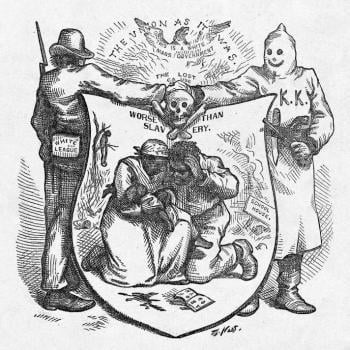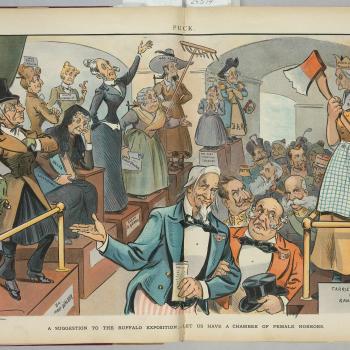Not many people read Henry Wadsworth Longfellow any more, but some of his poems do have unexpected treats.
Longfellow himself was a distinctly rational believer, a faithful Unitarian. Some of his poems, though, had a wider religious message, and his Christmas Bells has been much recorded in modern times. Someone could write a good book on the poem’s presence in popular religious culture.
Here, though, I focus on a different piece. In 1863, Longfellow published a poem with a thoroughly medieval and even Catholic feel to it. This was “The Sicilian’s Tale: King Robert of Sicily,” about a powerful medieval ruler. It’s a parable about pride, with a creative use of scripture. King Robert,
On St. John’s eve, at vespers, proudly sat
And heard the priests chant the Magnificat,
And as he listened, o’er and o’er again
Repeated, like a burden or refrain,
He caught the words, “Deposuit potentes
De sede, et exaltavit humiles;”
And slowly lifting up his kingly head
He to a learned clerk beside him said,
“What mean these words?” The clerk made answer meet,
“He has put down the mighty from their seat,
And has exalted them of low degree.”
Thereat King Robert muttered scornfully,
“‘T is well that such seditious words are sung
Only by priests and in the Latin tongue;
For unto priests and people be it known,
There is no power can push me from my throne!”
And leaning back, he yawned and fell asleep,
Lulled by the chant monotonous and deep.
But God punishes his pride, placing an angel in his stead as king, and reducing him to the much-mocked Court Jester. When Robert claims his real identity, he is denounced as a madman or a joker.
That exchange lasts for several years – in fact, until one Easter when Robert acknowledges his own weakness and his sinful state. At that point,
They heard the monks chant in the chapel near,
Above the stir and tumult of the street:
“He has put down the mighty from their seat,
And has exalted them of low degree!”
And through the chant a second melody
Rose like the throbbing of a single string:
“I am an Angel, and thou art the King!”
Robert is duly restored, but a chastened and humbled man.
The poem gives a sense of the power of those particular verses from the Magnificat. They are so dangerous that they have to be kept from the poor and weak, lest they get seditious ideas.
It’s striking to discover such words again, as if for the first time. Otherwise, we tend to hear them, but we can get “lulled by the chant monotonous and deep.”
Although it’s not essential to appreciating the poem, there is an interesting historical context here, which adds almost a journalistic element to Longfellow’s work. Understanding this explains an apparent mystery: why would the rational Longfellow seem to be writing a pious neo-medieval tale?
Italian events were much in the news precisely around this time, with the process of Italian unification, the Risorgimento. In summary, liberal and progressive forces were fighting hard to create a united nation of Italy, in the teeth of deadly opposition from various reactionary monarchies, who were allied with the Catholic Church. By 1860, the anti-nationalist forces were led by the Austro-Hungarian Empire, the Papal States, and the Naples-based Kingdom of the Two Sicilies.
Although there were many candidates for the title, perhaps the most notoriously reactionary sovereign of the day was King Ferdinand of the Sicilies, who in 1848 had mercilessly bombarded his subjects during a liberal insurrection at Messina. Ever afterwards, he was known as Re Bomba, King Bomb. Bomba himself died in 1859, but his regime persisted.
In 1860, the Sicilies were the scene for the decisive event in the unification movement. Giuseppe Garibaldi led an insurgent force to support revolts here, and the nationalist revolution triumphed when Naples fell in 1861. The victorious nationalists proclaimed a new united Italian kingdom.
As a good liberal New Englander, Longfellow sympathized totally with the rebels, whom he saw as fighting for progress and enlightenment – distant allies in the wider cause that the North was fighting for in the ongoing American Civil War. In 1861, indeed, Garibaldi had modestly volunteered to become commander in chief of US forces in that conflict. The fact that the Italian nationalists were fighting against what was perceived as oppressive Catholic tyranny was an added bonus. I wonder if the poem’s “learned clerk” is a dig at the then-Pope, Pius IX, a deadly foe of Italian nationalism.
How could Longfellow not mock the foolishness of reactionary Sicilian kings who felt that their power was secure forever? So the king believed that “There is no power can push me from my throne”? Indeed there was, and his name was Garibaldi.
On a Longfellow-related note, I recently read a convincing theory pointing to his strong influence on Tolkien. Is Longfellow due for a revival?












